Africa’s Policy Priorities for Food Security and Nutrition
Submit a question
Dr. Monde Muyangwa, Director of the Wilson Center Africa Program, welcomed guests on behalf of the Africa Program and the Environmental Change and Security Program. She noted the African Union has declared 2022 the Year of Food Security and Nutrition, observing that while Africa has increased food security and nutrition under the framework of the Comprehensive Africa Agriculture Development Program (CAADP), challenges related to hunger, food insecurity, and nutrition persist. International and regional conflicts, climate change, and the COVID-19 pandemic have highlighted the need for a continent-wide approach to mitigating problems of food insecurity and malnutrition.
Ambassador Mark Green, President and CEO of the Wilson Center, provided opening remarks before introducing Ambassador Cindy McCain to give the introductory address. Amb. Green thanked the African Union Commission and the U.S. Department of State for their partnership and participation in this discussion. Noting the progress that African countries have made in strengthening food systems and accelerating human development in the last 20 years, he highlighted that the conversation occurred at a crucial moment as climate extremes, the pandemic, and conflicts, including Russia’s war against Ukraine, have threatened Africa’s food systems. These challenges necessitate continent-wide approaches and enhanced U.S. support for Africa-led strategies and priorities. He noted recent actions by the U.S. government: USAID has invoked emergency authorities to use more than 280 million dollars from the Bill Emerson Humanitarian Trust that will bolster emergency food operations, including in five African countries, and the U.S. was convening a UN Security Council (UNSC) debate to discuss issues of conflict and food security.
Ambassador Cindy McCain, Permanent Representative of the U.S. Mission to the UN Agencies in Rome, spoke to the importance of food security as a central issue linking pressing global challenges. The United States is focused on helping meet short-term food and nutrition needs while engaging with the AU, regional economic communities, and member states on longer-term food systems transformation. She underscored the crisis caused by Russia’s aggression against Ukraine and its far-reaching effects, particularly on vulnerable communities already affected by extreme weather and other emergencies as food and fertilizer prices have soared while stable food supplies and humanitarian rations decreased. The United States is focused on mitigating these effects in partnership with the World Food Programme (WFP), The UN Food and Agriculture Organization (FAO), and the International Fund for Agricultural Development (IFAD) by delivering life-saving assistance, bolstering humanitarian responses, and offering technical expertise. Amb. McCain noted that strengthening the global food system is an important long-term goal. Consequently, the United States had dedicated its presidency of the UNSC in May to Food Security, including a Global Food Security Call to Action ministerial intended to mobilize resources for key agencies and promote commitment to strategies to bolster global food security. She urged that integrating science-backed approaches and innovations, embracing creative partnerships and private sector expertise, and working with research groups and governments are key to success in these efforts.
Panel 1: “Food Security: Systems Strengthening to Increase Production, Trade, and Sustainability,” assessed African Union and Member state efforts to address food production and develop effective food systems to support trade and sustainability; highlighted the AU’s policy priorities; and identified areas for U.S.-AU cooperation on food security, including U.S. Government assistance to African food security strategies.
Dr. Monde Muyangwa introduced the first panel and welcomed the speakers.
H.E. Ambassador Josefa Sacko, Commissioner for Agriculture, Rural Development, Blue Economy, and Sustainable Environment, African Union Commission, began her keynote remarks by noting that the event indicated the strong relationship and collaboration between the U.S. Government in the implementation of CAADP and the U.S. support for the AU’s work on livestock development. Most recently, the AU and U.S. have worked together to advance food safety and plant health through the development of three frameworks: the AU Sanitary and Phytosanitary policy, framework, the AU Food Safety Strategy, and the AU Plant Health Strategy. Amb. Sacko noted the enthusiasm for further partnership on issues such as nutrition, agri-business development, post-harvest management, and food fortification. She recognized the support from U.S. government agencies and U.S.-funded organizations such as the International Food Policy Research Institute, Akademiya 2063, and the Alliance for a Green Revolution in Africa, among others. Africa, she stated, is facing a food security and nutrition crisis brought about by consecutive shocks to the food systems. These shocks have both exposed Africa’s vulnerability and revealed opportunities to address core, systemic challenges. The AU strategy, she noted, rather than primarily reactive, is aimed at concentrating efforts on building resilient food systems for the future. She highlighted five priority areas for the AU. First: increase food production, especially of staple foods. This will redirect funds to small-scale food producers across the continent and promote food sovereignty to protect the population from erratic food markets. Second: reduce post-harvest food losses to make more food available and reduce the production carbon footprint. Third: invest in climate-smart agriculture to produce climate-smart technology that reaches Africa’s farmers. Fourth: promote inter-African trade in agriculture and services via the African Continental Free Trade Area. The AU is working to establish an African Food Safety Agency, which, she noted, is an initiative in which the AU would welcome collaboration with the U.S. Food and Drug Administration. Fifth: Strengthen mutual accountability through the CAADP annual review mechanism to take stock of progress and pinpoint areas of focus for member states in agricultural transformation. Amb. Sacko concluded by reiterating the AU’s desire to strengthen partnerships with U.S. government agencies and build functional relationships with the U.S. private sector and civil society.
Dr. Jim Barnhart, Assistant to the Administrator, Bureau for Resilience and Food Security, United States Agency for International Development, reiterated concerns about the systemic shocks increasing food insecurity in Africa. He noted that as as driver of economic growth, a productive and resilient agriculture sector has the potential to blunt the effects of climate change and geopolitical shocks. However, achieving such productivity and resilience requires inclusive and evidence-based policy decisions. Mr. Barnhart stated that over the next five years, the United States intends to invest five billion dollars in food security and nutrition through Feed the Future. Feed the Future will promote inclusive agriculture-led growth, improve access to safe, nutritious food, and support climate-smart agriculture. The United States will also invest up to 11 billion dollars over the next three years to address global malnutrition. The United States particularly commends the AU and member states’ leadership in advancing CAADP, implementing the AfCFTA, and setting and championing policy agendas to address food security challenges and spur inclusive growth. Accelerating CAADP progress is among USAID’s highest priorities. USAID’s approaches also include partnering with countries to mitigate climate change effects through its recently launched Climate Strategy, through the Comprehensive Africa Climate Change Initiative (CACI), and through country-level National Adaptation Plans; by deploying funding and technical assistance; and by focusing efforts on responding to current crises. Specific priority areas include: increasing access to food production inputs, increasing farmer productivity—including supporting women farmers—increasing access to improved technologies and financing, and strenghthening private sector markets. He noted that USAID’s Nutrition Leadership Council recently updated its nutrition priorities and 13 of 18 countries targeted for strategic support are in Africa, further demonstrating the agency’s commitment to partnership with the AU and African leaders.
Dr. Cary Fowler, U.S. Special Envoy for Global Food Security, chaired the discussion with Dr. Barnhart and Dr. Godfrey Bahiigwa, Director of the Department of Agriculture, Rural Development, Blue Economy, and Sustainable Development, African Union Commission. The discussion focused on better understanding the existing challenges to improve partnerships, building resilient food systems, addressing systemic food production constraints, the need for increased investments (particularly in research and extension services), the need for high-quality research and data, (an effort supported through Feed the Future’s innovation lab partnerships), reducing post-harvest food loss, and improving food safety. Dr. Bahiigwa also noted the existing collaborations between the AU and USDA, particularly on sanitary and phytosanitary standards and food safety standards. He expressed the desire for further strengthening of partnerships with the private sector and civil society as well as with the FDA while Dr. Barnhart noted the importance of building on digital technologies and making the sector attractive to young people.
Panel 2: “Nutrition-Smart Progress: Critical Interventions” assessed the current state of nutrition on the continent and how to accelerate progress including through U.S.-AU cooperation, adequate financing, implementation capacity, and coordination efforts to advance critical interventions.
Ms. Alyson Grunder, Associate Director and Senior Diplomatic Fellow at the Wilson Center Africa Program introduced and welcomed the speakers for the second panel.
H.E. Cessouma Minata Samaté, Commissioner for Health, Humanitarian Affairs, and Social Development, African Union Commission, offered keynote remarks on the state of nutrition across the continent and the AU’s high-level focus on improving nutrition levels. Following the Malabo Declaration’s commitment to end hunger by 2025, significant progress has been achieved. However, many members are not on track to achieve their targets and the COVID-19 pandemic and Russia-Ukraine crisis have contributed to the reversal of gains in many countries. The number of malnourished people in Africa increased by 46 million between 2019 and 2020. Additional challenges include an increasing number of people unable to afford a healthy diet, higher stunting prevalence rates, wasting prevalence, anemia, and obesity rates. The AU identified policy priority areas to face these challenges, including strengthening data management and information systems in partnership with the AU Statistical Institute and increasing investment in nutrition by working with African leaders to advocate for increased commitment and domestic resource mobilization. On nutrition investment, Amb. Samaté noted an AU study linking the economic and social costs of child under-nutrition that highlighted the need for increased financing and multi-sectoral coordination. The AU is also seeking to enhance partnerships and improve institutional capacity, by working with institutions like New Partnership for Africa's Development (NEPAD), the African Development Bank (AFDB), regional economic communities, and bilateral and multilateral partners. The AU launched an accountability scorecard in 2019 to collect nutrition data from member states to increase accountability. The AU also has a nutrition report to track member state commitments that will launch in 2022. Amb. Samaté highlighted that preventing malnutrition requires an enabling environment at national and community levels including, among others, safe water and sanitation, women’s education and empowerment, and sufficient food quality and quantity.
Mr. Jason Hafemeister, Acting Deputy Undersecretary for Trade and Foreign Agricultural Affairs at the United States Department of Agriculture, outlined the programmatic activities of USDA in collaboration with and support of the AU’s nutrition policy initiatives. USDA is committed to supporting agricultural-led economic growth, food security, nutrition, and open trade across Africa through CAADP. The U.S. and AU joined the Schools Meals Coalition created at the UN Food System Summit and both belong to the Coalition’s task force and working group. Mr. Hafemeister noted that USDA’s McGovern/Dole International Food for Education and Child Nutrition Program is the largest international school-feeding program with a 2022 appropriation of $237 million. This program’s priorities align with the AU’s nutrition goals and its approach is to support host government efforts to strengthen the enabling environment by developing and refining policies, infrastructure, local and regional supply chains, and human capital. The Sustainable Productivity Growth Coalition, which grew out of the UN Food Systems Summit and aims to increase environmentally and economically sustainable agricultural production, includes several African countries and academic and research institutions. He emphasized leveraging evidence-based innovation, science, and new technologies to expand the toolbox for producers to improve food affordability, sustainability, and food system resilience. The Agriculture Innovation Mission (AIM) for Climate is another U.S. initiative to close the investment gap and increase collaboration across government and non-governmental partners to support climate-smart agricultural innovation; five AU countries and nine Africa-based organizations have joined AIM. Additional USDA activities include an upcoming workshop under the Africa Seed and Biotechnology Program to enhance seed systems and biotechnology product deployment. He commended the AU Sanitary and Phytosanitary policy framework that helps RECs and member states harmonize and strengthen sanitary and phytosanitary systems. He concluded by commending AU country commitments through the Malabo Declaration and the AfCFTA, especially as moving food from surplus to deficit regions via trade is a critical tool for combating food insecurity and malnutrition. USDA is looking forward to working with African countries to support two-way trade with the U.S. to meet demand and create opportunities.
Dr. Bahiigwa chaired the discussion with Ambassador Samaté and Mr. Hafemeister. The discussion focused on working with communities to encourage good nutrition, supporting consumer’s freedom of choice through diversity and sufficiency of food supplies, ways to support nutrition strategy implementation by AU members at community, national, and regional levels, working with youth to engage them in the sector, and financing implementation efforts through investment and the private sector, sustainable production and processing, improving markets and increasing production, encouraging investment and new technologies, and establishing science-based regulatory frameworks to encourage healthy food,
Congressional Remarks: Senator Chris Van Hollen, Chair of the Senate Foreign Relations Committee on Africa and Global Health Policy, shared a message on how Congress is seeking to advance its policy priorities and support Africa’s food security and nutrition efforts.
Mr. Michael Bittrick, Senior Advisor, Office of Global Food Security at the U.S. Department of State introduced and welcomed the speakers for the Congressional remarks and the closing remarks.
Senator Van Hollen, U.S. Senator from Maryland, and Chair of the Senate Foreign Relations Committee on Africa and Global Health Policy, remarked on the essential role access to nutritious food plays in supporting thriving populations, not only in the United States but globally. He noted the variety of factors impeding the agriculture sector and export markets, with severe effects, particularly in East Africa, the Sahel, and the Horn of Africa. He spoke to the Senate Foreign Relations Committee’s commitment to addressing this food crisis to help get the global economy back on track and improve stability and security in the region. He noted President Biden’s call to pass a $33 billion Ukraine response bill that included additional funds to strengthen food security. Senator Van Hollen noted his support for increasing the amount of food aid in the supplemental package as humanitarian organizations called for $5 billion to address global food insecurity. He noted his partnership with Senator Mike Rounds (U.S. Senator from South Dakota and Ranking Member Senate Foreign Relations Committee on Africa and Global Health Policy) to strengthen U.S. ties with African partners, supercharge trade and investment, and build more resilient food markets and economies.
Closing Remarks
Ambassador Jessye Lapenn, U.S. Ambassador to the African Union, closed the event by reflecting on key takeaways and messages. Amb. Lapenn noted the alignment among speakers around defining the problem and proposing solutions. Among those areas of alignment were: a focus on building resilient food systems to withstand current and future shocks; focus on reducing post-harvest loss; promoting intra-African trade; improving food safety standards; increasing private sector involvement and investment; and the important role of youth in the agriculture sector. A key takeaway from the dialogue was the historic and ongoing commitment of the United States and the AU to collaborate and advance food security and nutrition on the continent. The need for data and evidence was emphasized in both panels as a critical need for policymaker decision-making and resource mobilization, as was working with member states to accelerate their commitments and nutrition and food security goals. The supportive roles that universities, NGOs, government, and the private sector can play in these issues were also highlighted, as was the need to engage communities—particularly youth and women—to strengthen the agriculture sector and improve nutrition. Trade and fostering open borders in a market-oriented, rules-based system were noted as part of the solution. Ambassador Lapenn concluded by highlighting the May UNSC meeting to be chaired by U.S. Secretary of State Antony Blinken and an upcoming Ministerial focused on food security as indicators of the level of importance these issues hold and the timeliness of this U.S.-AU event discussion hosted by the Wilson Center.
Speakers

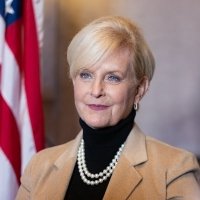

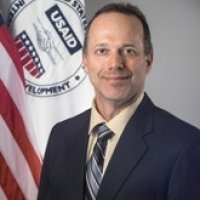


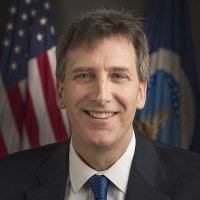
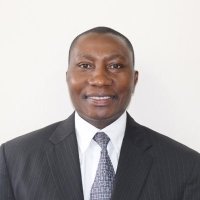
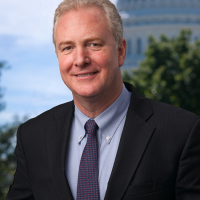
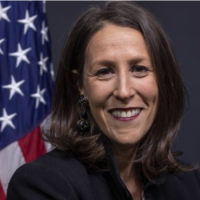
Introductions


Senior Foreign Service Officer, U.S. Department of State; former Deputy Chief of Mission, U.S. Embassy Monrovia, Liberia; former Deputy Assistant Secretary, Bureau of Educational and Cultural Affairs, US Department of State

Hosted By

Africa Program
The Africa Program works to address the most critical issues facing Africa and US-Africa relations, build mutually beneficial US-Africa relations, and enhance knowledge and understanding about Africa in the United States. The Program achieves its mission through in-depth research and analyses, public discussion, working groups, and briefings that bring together policymakers, practitioners, and subject matter experts to analyze and offer practical options for tackling key challenges in Africa and in US-Africa relations. Read more


Environmental Change and Security Program
The Environmental Change and Security Program (ECSP) explores the connections between environmental change, health, and population dynamics and their links to conflict, human insecurity, and foreign policy. Read more
